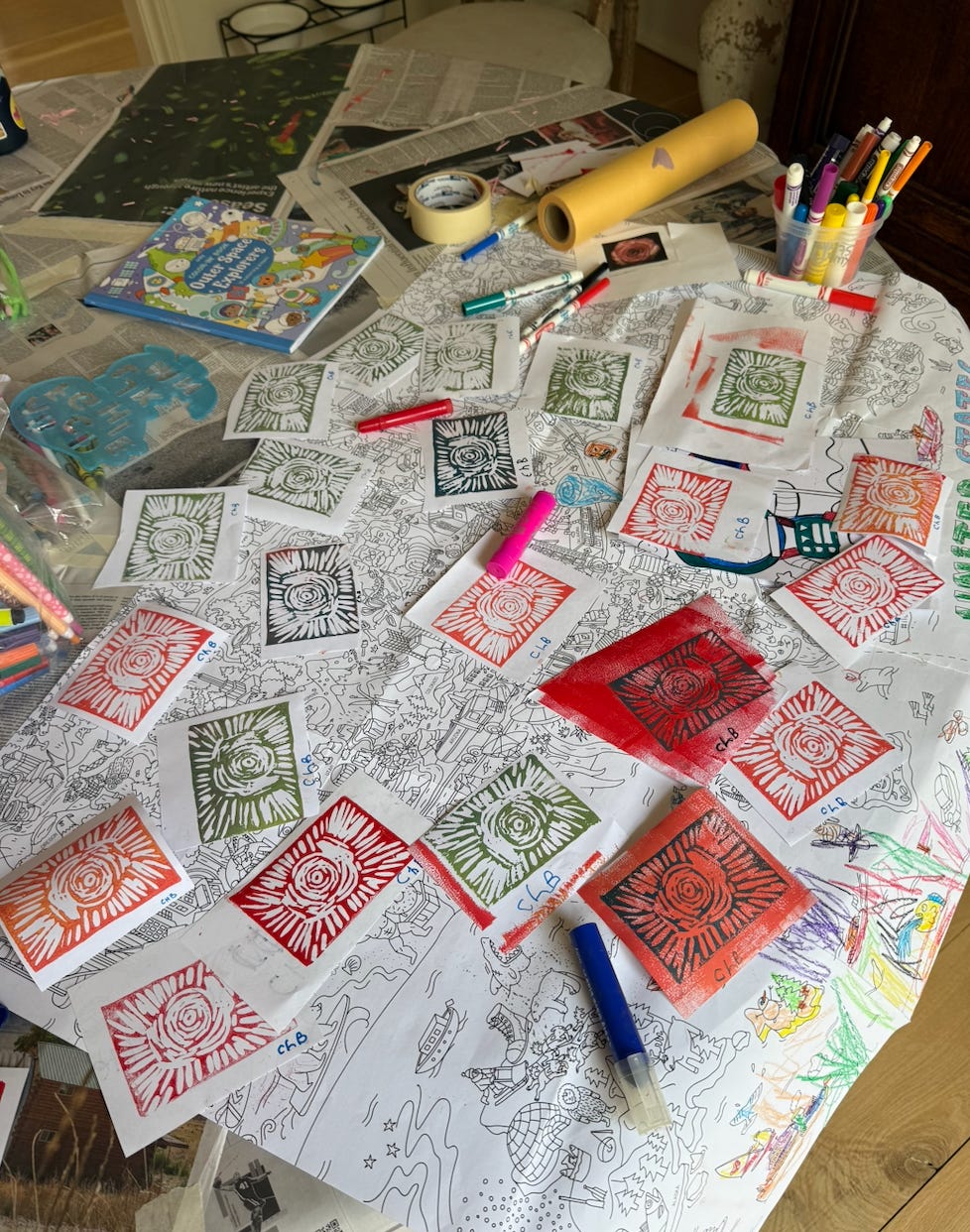Summer Projects
On that summer feeling, work as a means vs. work as an end, and an earnest commitment to senseless hobbies.
When I think of summer as a kid, I think of a series of feelings and sense memories: heat and humidity like an extra layer of clothing; the squeaky-crunchy feel of over-chlorinated hair; the pulse sharpening *errhhn* of a swim meet start horn; the crack of a frozen snickers on my back molars; the blast of air conditioning coming home through the back door; daylight still thick in the early evening; the swelling whirr of crickets; time slowed like a deep river.

When I think of summer as a parent, I think of scheduling.
I think of summoning all my (limited) planning abilities to navigate changing drop-off times and locations, not miss swim meet sign-ups, earnestly try to manage the amount screen time (and snacks, and treats!) my children consume, make sure the kids have lots of unmitigated fun!, and dutifully attend to the ongoing demands of my work.
And all of this while wondering whether summer can still bring about some shift in the way we experience time. I know it does by necessity to some extent; out of the train track rhythm of the school year there is less structure and constraint, but is there also way to capture or create more of that free-flowing feeling?
One path is saying “no” to things, drawing firmer boundaries. In the midst of the activity onslaught that is middle-age my first inclination is to try to do less. But I am also no zen master, and I know that something will almost certainly invade any unstructured space I create.
This makes me think the trick here may not just be doing less per se, but changing the character of the things we do. Picking up activities that can shift our our attention away from work as a means and into work as an end.
Work as a means is activity that intends to accomplish a goal. This is how we typically think about work. It is doing X to get Y; some specific a goal or goals, usually money, status, recognition, affiliation, etc. Work as a means is either effective or not. It delivers its intended goal(s) or it doesn’t. It operates under the logic of productivity. You’ve done more or less of it to greater or lesser effect. How many projects have you won/completed? How many paying clients do you have? How much time have you billed?
Work as an end is activity that is done for its own sake. It is work as an infinite game, one in which the primary objective is to continue doing the work. Work as an end is more how we think about hobbies and art. These activities tend to operate under the logic of enjoyment. We don’t necessarily think of them as effective or not, though we may be interested in, or observe ourselves getting better at the activity, in some way the point is simply to continue.
Consider the different adjectives we use to describe people who do a lot of a certain type of activity. Under the logic of work as a means we may say of someone who is billing a lot of hours that they are productive. Productive is “achieving or producing a significant amount of something,” in this case revenue for yourself or your organization.
And under the logic of work as an end we may say that someone is prolific. In fact a very similar word - enough so to be used as a synonym in some cases - but prolific means “producing much fruit.”
This may be splitting hairs, but I think it’s actually a hair worth splitting. Prolificacy may be a facet of productivity, but the difference between producing a significant amount of something and producing much fruit is the underlying element of control. There is an amount of oblique action implied by prolificacy that lends it a particular character. For example, planting a tomato vine does not necessarily produce tomatoes, certainly not in the same way that chopping wood produces logs. One could have a productive season of tomato vine planting, and still not be a prolific tomato farmer. Said another way, drawing does not necessarily produce art in the same way that billing an hour produces revenue.
It is far easier to justify an hour spent billing a client than it is to justify an hour spent drawing a tomato. Whether you think one activity is more useful than the other likely depends on whether you’re operating under the logic of work as a means or work as an end.
In my own attempt to regain more of That Summer Feeling, I’ve taken on a few summer projects. Think summer reading, but for hobbies.
My projects at the moment are 1) teaching my daughter (and myself) how to draw and make linocut prints, 2) learning how to play a few pop country songs on guitar from memory, and 3) keeping notes on my vague notion of a novel idea.
The only requirement is that they push back against my desire fill all my time being productive in some economic or domestic sense; to, on occasion, shift myself out of the mode of viewing work as only a means to some other end.
Perhaps boxing out space for these activities will seed new sense memories for summer, beyond just the scrambled feeling of stitching kid’s schedules together: birds flitting and calling in the early morning while I write notes on the porch; hearing my daughters sing along with me to Barefoot Blue Jean Night; drawing contests with fat paint pens; the dining room table littered with drying linocut prints; my daughter looking up at me, walking to the car late after a swim meet and saying, “Dad why is summer so long?”
May that feeling last.






